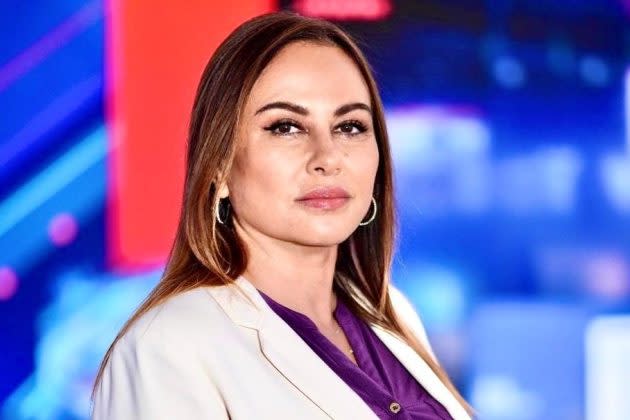ElectionLine’s View From Abroad: Al Arabiya’s Washington D.C. Chief Nadia Bilbassy-Charters On Feeling Like The “Lone Voice” Grilling White House Officials Over The Israel-Gaza Crisis

Welcome to ElectionLine’s A View From Abroad series, in which we speak with media figures who are not from America but keep a close eye on its politics. Every few weeks, these smart observers will provide a unique perspective on the fraught and unpredictable campaign for the White House. This week, our interview is with Nadia Bilbassy-Charters, the Washington D.C. bureau chief for Al Arabiya, the state-owned Saudi Arabian Arabic news network.
Nadia Bilbassy-Charters evokes a vivid image as she recalls her former home in Gaza City. She speaks of a happy place; a sun-soaked villa with cherry, fig, and olive trees on the shore of the Mediterranean Sea. It is all rubble now, she says ruefully. And the tragic consequences of the Israel-Gaza crisis are not just bound up in bricks and mortar for Bilbassy-Charters: 12 members of her extended family have been killed since the Hamas atrocities of October 7.
More from Deadline
Al Arabiya’s Washington D.C. bureau chief only allows herself a flicker of sentiment as she reflects on the personal toll of the Middle East conflict. “I don’t really feel it’s relevant to my reporting,” she says without hesitation when asked if she can separate colliding personal and professional interests.
Bilbassy-Charters is a journalist of deep experience. She earned her stripes covering the 1980s Palestinian Intifada for AFP, before working for the BBC and British newspaper The Independent. Her reporting has taken her to 56 different countries, including being stationed in Ethiopia and Kenya for MBC Group, the Saudi media conglomerate. By 2003, Bilbassy-Charters had moved to the U.S. to cover politics for Al Arabiya and she now calls the country home. Her children are Americans, she says.
Bilbassy-Charters has been in the room with four different White House administrations, starting with George W. Bush in the heat of the Iraq war. Her job is to tell an Arab audience of 120M people how decisions in D.C. shape the global agenda. Unsurprisingly, the Israel-Gaza conflict has been all-consuming, and Bilbassy-Charters regularly pops up on U.S. networks like NBC asking questions of officials including John Kirby, the White House’s national security spokesperson. “I have been giving them a hard time,” she laughs.
At a briefing last week, for example, she asked State Department spokesperson Matthew Miller about comments made by Aryeh Neier, the Human Rights Watch co-founder and Holocaust survivor, who said he had been “persuaded” in recent months that Israel is “engaged in genocide against Palestinians.” Miller responded: “Fundamentally, [we] do not see it that way and don’t think the facts support it at all. That is not to say that there has not been massive human suffering.”
Similar exchanges have led some conservative commentators to accuse her of pedaling “anti-Israel smears,” but Bilbassy-Charters considers herself a non-partisan participant in this conversation. She says she has never been asked to pursue a particular agenda by her superiors in Saudi Arabia, where leaders are pressuring Israel to recognize an independent Palestinian state. “We can do a better service to our audience and society in general when we stay impartial,” she explains during a Zoom interview. “To credit my station, I have never got a guideline from them.”
Bilbassy-Charters says she often feels like a “lone voice” during press conferences, especially in the weeks after October 7 when “99% of the biases” were with Israel. “Many of my colleagues, especially in the White House press corps, were timid in asking serious questions because they were worried,” she says. “This war has exposed people and shows clearly some biases … and also laziness in checking facts and a lack of historical knowledge.”
She adds: “I’ve been a foreign reporter for almost 40 years. You have to hold officials accountable, they can’t get away with double standards or with the narratives they are going to give you. It doesn’t mean that I’m trying to make them look good or bad. That’s not my job. My job is to ask the question.”
Bilbassy-Charters, who is a member of the White House Foreign Press Group, says Joe Biden’s administration is the most tightly controlled she has encountered, echoing the views of many colleagues in our A View From Abroad series. She only sees this grip getting firmer as the election grows closer, but it will not stop her from pursuing interviews with Biden and Donald Trump, arguing that they have a duty to address millions of Arab-American voters. Bush and Barack Obama have previously sat down with Bilbassy-Charters, while she got access to Jill Biden last year during the first lady’s tour of the Middle East.
Speaking days after the conviction of Donald Trump in New York, she says Al Arabiya viewers are as conflicted about the former president as American voters. Some say the verdict shows Trump is not “above the law,” while others are suspicious about the motives behind bringing the case to trial so close to an election. Domestic issues like this will soak up more of Bilbassy-Charters’ time before November 5, with plans to do a show in which she travels battleground states to take the “pulse” of America.
As for her memories of Gaza City, they will wait for a book she is currently writing about her journey as a journalist. “I want to describe the Gaza I grew up in and how now it has turned into a graveyard,” she explains. Bilbassy-Charters says she can divorce her reporting from her history, but it is only human that she feels the Israel-Gaza crisis in her bones.
Best of Deadline
Sign up for Deadline's Newsletter. For the latest news, follow us on Facebook, Twitter, and Instagram.

